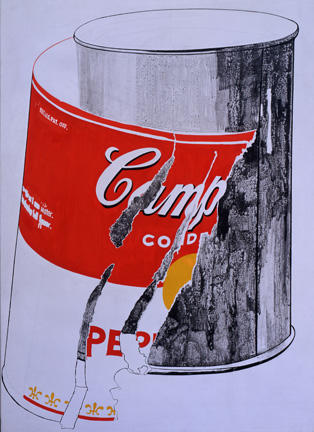The subject for this week is iconography art. I have been really impressed by the subject because I have always paid attention to the icons or symbols in the art. Actually, in art criticism, iconography is defined as the description and systematization of typological features and patterns taken by the portraying of any character (real or legendary) or storyline scenes. This intricate definition hides just the symbols or images that surround people everywhere in their daily life.
I should emphasize that iconography has a very long history. It has existed in various forms – from the religious images of the pagan gods, the Lord, saints to the icons that represent the pop art objects. But during the long course of its development, this kind of art served the same purpose – to be a visible means of communication. The reading of this week reveals the ideas about the essence of an icon.
The icon could be “any image used to represent a person, place, thing or idea,” “pictures designed to actually resemble their subjects”( McCloud 27). I absolutely agree with the idea that the icons are the nonverbal sources of information. We just have to stop for a minute, look at the icon, and reflect on the informative side of it. One icon can give us enough information about the object it depicts.
Michael A. Salter, a Professor of Digital Arts at the University of Oregon, is the author of a series of installations in a number of museums and galleries of art, who made attempts to deal with a large amount of informative media content. His attempts have found their way out in numerous logos, icons, and installations. I felt really excited while watching the installation of robots. He examined the development of the icon of a robot in pop art.
While creating huge statues of Giant Sty robots, Michael “pulled” on a huge robot, the textured “skin” from scraps of foam packaging. In his works, Michael partly hypertrophied the concepts embodied in the images and statues, but he did it only in order to focus the audience’s attention on some important things.
Michael embodied the image of evil idols that warn people about their high rate of resources’ consumption and the hopeless future awaiting them when these monsters – the products of humans’ consumerism – will destroy us. Among the infinite variety of materials, the artist chooses, at first glance, the worst possible – lightweight foam – to implement such a powerful, solid, and heavy concept of a GREAT humanoid robot. But in his hands, another facet of the material revealed itself.
Another artist who deals with iconography is Chris Coleman. His installation “W3Fi” represents “a social movement, a philosophy, a path to responsible connectivity between our online/offline lives and to each other” (W3FI). Coleman draws attention to the impact of pop art and the digital world on our lives. “Collision” is my favorite work by the artist. By the way, this work has a very similar idea to the robots by Michael Salter – it demonstrates the destructive nature of our future.
While watching his piece of art, I began to think about the consumerism of our society and the tendency of people to self-destruction. The piece depicts the “life” of a factory that naturally incites us to think about air pollution. The author says to us, “we must understand that that smoke is the result of producing the things we use every day, from our clothes to our food” (W3FI).
The work of art that has much in common with the ideas of two previous artists is the picture of Andy Warhol, “Big Torn Campbell’s Soup Can (Pepper Pot).” The picture reveals the same idea as any pop art piece – consumerism. It displays the everyday thing – the quintessential American product. I like the idea of Warhol – that the soup has always had the same taste like the “Coca-Cola,” regardless of who has eaten it – a prince or a pauper. These soup cans erect mass production to the level of art.

Works Cited
McCloud, Scott. Understanding Comics: The Invisible Art. New York: Harper Perennial, 1993.
“W3FI.” digitalcoleman.com. n.p. 2011. Web.